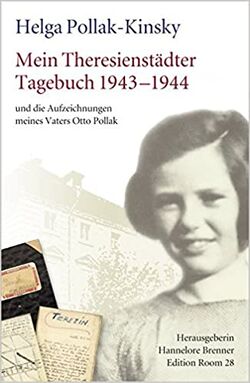Helga Pollak-Kinsky (F / Austria, 1930), Holocaust survivor
Helga Pollak-Kinsky (F / Austria, 1930), Holocaust survivor.
- One of the Girls of Room 28
- A choir member in Brundibar
- KEYWORDS : <Austria> <Theresienstadt> <Auschwitz> <Liberation of Theresienstadt>
- MEMOIRS : Mein Theresienstädter Tagebuch (2014)
Biography
Helga Pollak-Kinsky (b.1930) was born in Vienna, Austria. Her father Otto Pollak (1894–1978) was a disabled veteran of the First World War and the owner of the Palmhof concert café at Mariahilfer Strasse 135. Her parents separated and her mother, Frieda Pollak, emigrated to Great Britain. After the Anschluss, she was sent to live in Czechoslovakia. In January 1943, she and her father were deported to the Theresienstadt ghetto. There she was sent to the girls' home L 410, room 28. She was among the extras when Kurt Gerron was forced to make the film Theresienstadt.
On October 23, 1944, Pollak was transported to the Auschwitz concentration camp and from there, as a concentration camp prisoner, was transferred to a subcamp of the Flossenbürg concentration camp in Oederan for forced labor. In April 1945 she was transported back to the Theresienstadt concentration camp on a prisoner transport, where she was liberated with her father.
In 1946 Pollak moved to her mother's home in London and attended college there. In 1951 she married a Jewish German who had escaped to Bangkok during the Nazi era. They had two children, lived in Bangkok and Addis Ababa, and returned to Vienna in 1957.
The American documentary filmmaker and Theresienstadt survivor Zuzana Justman made two films with her: Terezín Diary (1989) [5] [6] and Voices of the Children (1997) [7], which in 1999 received an Emmy Award.
She is one of the Girls of Room 28 featured in 2004 in Hannelore Brenner's book. Her diary served as a red thread in the volume and was eventually published in 2014.
Helga Pollak-Kinsky received the Federal Cross of Merit on Ribbon of the Federal Republic of Germany in 2013. In January 2014 she was invited by the United Nations to speak at the Holocaust commemoration in Geneva. In January 2015 she was one of 19 survivors of the Auschwitz concentration camp, whose story was included in the comprehensive cover report The Last Witnesses in the German news magazine Der Spiegel. In April 2016 she was awarded the Golden Medal of Merit of the State of Vienna.
Book : Mein Theresienstädter Tagebuch (2014)
- Mein Theresienstädter Tagebuch 1943–1944 und die Aufzeichnungen meines Vaters Otto Pollak' (Edition Room 28, Berlin 2014).
""Brother Spider" is how Helga Pollak-Kinsky baptized her diary, which she began keeping at the age of twelve in the girls' home L410 of the Theresienstadt ghetto. Her notes, supplemented by those of her father Otto, have now been published in exemplary fashion by Hannelore Brenner ... The Theresienstadt Diary by Helga Pollak-Kinsky looks radiant because of the overwhelming talent of this 12-13 year old girl, her keen and deep thoughts. Because of Helga's will to self-criticism, her hunger for experience, for friendship, for confidence, Helga's diary is a unique document of resistance.
Book :
Study: Hannelore Brenner-Wonschick: Die Mädchen von Zimmer 28. Freundschaft, Hoffnung und Überleben in Theresienstadt (München: Droemer, 2004)
